- Home
- Sharon Shinn
The Shape-Changer's Wife Page 17
The Shape-Changer's Wife Read online
Page 17
Then it was as if every beast in the forest let loose at once with whatever howl, cry or moan its throat would carry; there was a cacophony of primitive elation that rose from all sides, miles in each direction. Trees cavorted from the force of a driving wind, or created the wind themselves, whipping their branches from side to side till they clattered and interlaced. Behind Aubrey, slowly, as if stone by stone were being pried loose and dropped, the sloppy gray mansion that was Glyrenden’s house toppled to the ground and began to disintegrate.
In the clearing just in front of the decomposing porch, the five living creatures that remained tried to keep their balance on suddenly shifting ground and strained to recover their numbed and disordered senses.
Aubrey woke from what seemed like a trance to find himself still clutching the bloodied knife and staring down at the crumpled figure of the dead wizard. It was a frightening thing to watch. Glyrenden had been dead less than a minute, yet all the scavengers of the forest had already gone savagely to work on him, the ants, the maggots, the fungi and the molds. Across each wrist and ankle, and wound around the white throat, creepers twined to bind him in place. His sooty black hair had fallen back from his white face, and the shape and structure of the skull could be plainly seen under the besieged membrane of the skin. By nightfall, not a bone nor scrap of hair would be left; not a rock would mark the place the house had stood. Glyrenden and his effects would have disappeared.
Aubrey roused himself with a sudden fear, and before he even looked to check who still attended him, he raised his arms and spoke a quick spell of suspension. All movement halted within the radius of his incantation; the trees stopped their swaying, the busy ants froze, the grass lay quiet again. The bear, which had staggered to its hind feet, slumped down on its haunches. The tiny brown spider, scuttling toward the promising overhang of a felled gray brick, stopped in her sticky tracks. The young man lying on his side, horror and bewilderment on his face, settled in to sleep again. The fawn froze with one foot curled against her chest.
But Lilith had not moved at all, and she only stirred now when Aubrey came over to her.
“He’s dead,” Aubrey said to her unnecessarily.
She nodded. “For how long have you meant to kill him?” she asked.
“I suppose ever since I realized what he had done, and that he would not undo it.”
She gestured toward the others. “You have freed them with his death. Is that what you thought would happen?”
“Most of a wizard’s magics die with him. They tell stories of rubies turning to rocks and whole mountain ranges melting back into meadows when the death of the great sorcerer Talvis finally reversed some of his spells. But a good wizard can make magic that lasts after his death. He can speak spells that are so true they become the truth, and then only new magic can reverse them again.”
Now she looked at him, and plainly in the green eyes he saw the unspeakable longing he had only sensed before. Very simply, she said, “Can you change me?”
“I think so,” he said, “but I am not sure.”
She glanced at the body of Glyrenden, then back at Aubrey. “You changed him against his will in the heat of battle. I would think that would be a harder thing.”
Aubrey smiled with no mirth whatsoever. “My old teacher, Cyril, always told me it was easier to kill than to create,” he said. “I never understood what he meant, but the only spells he taught me were spells of creation, and they were very hard indeed. By comparison, destruction is much simpler. I have learned that for the first time today.”
“I don’t understand,” she said.
Aubrey pointed to a pile of fallen stones and they both sat. He carefully refrained from touching her. “To change something from one form to another is a difficult task, and the spells to do so are among the hardest things I have ever learned. To change a thing that has been made something else by magic is even harder, and the risks are greater. It was possible that I would kill Glyrenden by changing him back to his true form, but since I planned to kill him anyway, I did not greatly care. I run the same risk if I try to change you.”
“Oh,” she said.
“But I will try if you want me to.”
“Yes,” she said. “I want you to.”
Aubrey made no reply to that, hoping she might add a word or two to soften the finality of her choice, but she said nothing else. Finally, he rose to his feet again and made his way to where the other creatures waited, stayed in place by his quickly woven command.
He placed his hand over the bear’s eyes and took from him all knowledge of what it meant to be a man. He took away the memory of table and bedroom, village and fair, the rudiments of speech and the taste of cooked meat. He took away the hatred of mankind that he found in Orion’s heart, but he left the sense of terror that even a man’s faint scent could bring. “Go now,” he whispered, releasing the bear from the spell that held him in place. “Live well and happily, and avoid humankind for the rest of your days.”
He knelt beside the small brown spider and laid a finger fleetingly on her hunched back. There was little room in that tiny brain for memory, but Aubrey cleaned those cluttered cells as best he could of the shape and remembrance of womanhood. In her true form, she was a dainty thing, no beauty but delicately made. Aubrey stroked her back with the gentlest of motions. “Forget everything,” he murmured to her, “except your fear of men.” Then he lifted his hand and she hurried away, moving as fast as her thin, fine legs would carry her.
The fawn watched him motionlessly, her great eyes at their widest, and even under the spell of stillness, she trembled. Aubrey put his palms to either side of her pointed face and closed her eyes with his thumbs; and as he closed her eyes he wiped away all the interior images that caused her still to shiver. Almost immediately, she quieted, and almost as quickly grew frantic again. For he had not taken from her that instinctive distrust of man, and here he was, a man and holding her. He let his hands drop away and he undid his spell, and she darted away through the welcoming forest without a backward glance.
Last, Aubrey turned to the sleeping man, little more than a boy and wearing, even as he dreamed, a puzzled, frightened look. Aubrey rested his hand upon Royel’s brow and pulled from his thoughts all memory of the past four days, the journey to Glyrenden’s house, the awful moment of transfiguration itself, the feel of the dog’s feet, the foreign smoothness of the beast’s muscles, the sound of the hound’s baying, so strangely liquid coming from one’s own throat. He hesitated as he rummaged through Royel’s mind and found image after image of Lilith, but in the end, he allowed the boy to keep those visions. Had positions been reversed, he would not have wanted Royel to destroy his own pictures of the wizard’s wife; he could be that generous in return.
To replace the memories he took away, Aubrey fashioned new ones, of a fall from his horse, a dizzy day of amnesia, and two days of being nursed to health by a friendly peasant woman. The king might wonder why Glyrenden’s version of the young lord’s disappearance differed so radically from Royel’s own, but he would soon have more to wonder about as Glyrenden’s disappearance raised more questions. And those questions, Aubrey thought, will never be answered.
He rose to his feet and glanced over at Lilith, who watched him still. The boy at his feet continued to sleep. “Is he dead?” Lilith wanted to know.
“No,” Aubrey said. “But I think it will be best if we are gone from here before he wakes up. I am not eager to answer any questions he may have.”
She glanced around the clearing, which was less of a clearing every moment that they stayed. Aubrey had lifted his spell of suspension, and the forest was creeping closer, almost as they stood there and watched. “He may find this a strange place to awake if he sleeps too long.”
“I have laid a protection upon him. He will not be harmed.”
“And what news of Glyrenden will he carry back to the king?”
“No news, but only the rumor that will soon be on everyone’s lips—the gr
eat wizard is dead.”
She looked at the body of her slain husband with no expression on her face. “There will be no proof of that.”
“No,” said Aubrey. “But he is still dead.”
She came to her feet and looked at him directly, and he marveled again at how green her eyes were, such beautiful eyes in such a plain and such a beloved face. “And me?” she asked.
“We will walk to the King’s Grove,” Aubrey said, “which is a place I have long wanted to see. And then I will leave, and you will stay, and the world will be as it was before Glyrenden was ever born.”
“Not quite the same,” she whispered, and for a moment he thought he saw the faintest glitter of tears in her eyes. “For you will remember and use the spells he taught you. And I—I will live a long time with an alien memory in my heart.”
Aubrey was silent a moment. “No,” he said at last, very slowly. “You will be as you once were, with no thought except what belongs to you, and no memory except that of soil and season. I have made the others forget, and I will make you forget, and these three years will be as if they never were.”
“But if I am made to forget Glyrenden,” she said, still whispering, “does that mean I will forget you as well?”
“Yes,” he said.
“Then I do not want to forget.”
He was silent, for a wild hope laid a strangulating hand across his throat, and speech was impossible. She had felt nothing at all for Glyrenden, not love and not hate, for she was fashioned of a living thing that had no passions, desires or emotions. But she had been three years a woman, treated as a woman and loved as a woman by three very different men; she had speech and reason and a soul. Perhaps the transformation she had feared so greatly had finally come to pass.
“Lilith,” he said at last, his voice very low. “I know what you have suffered at Glyrenden’s hands and that you could never have come to love the man he was. But I am not like Glyrenden, and I have loved you for a long time. I will do what you say—I will take you where you want to go. But my life will be sere and empty without you. The world that once seemed so full of color and promise will be gray and tedious. Say you will stay with me. Remain a woman and become my wife. You do not know how good that life can be. I swear I would die to make you happy.”
She was silent a moment, her head bowed, her marvelous eyes hidden. Then she lifted her head and he could see she was crying, even though she smiled. She came closer and put her two hands on either side of his face; and it was the first time he could remember that she had reached out to him. “It would not make me happy for you to die,” she said. “And if I could be happy as a woman, I know it would be at your side. But you forget so many things, Aubrey, my dear. You forget how strange I am, and that even simple peasants recognize that strangeness in me—”
“They would say nothing against you while I was near,” he interrupted swiftly.
“You forget that I have no family, that I cannot make friends, that I have no skills and no conversation. I could not move with you in the world of men, in the exalted circles in which you will someday move.”
“I do not care for the society of rich and exalted men. I would be content in a cottage in an untracked forest, if you were in the cottage with me.”
She smiled again. “You would not be content. You are a great wizard, Aubrey, and you are destined to be with great men. It would not help you to have me at your side.”
“I love you,” he said helplessly. “It could not hurt me to have you near me for the rest of my life.”
“But Aubrey,” she said, “can you not see how it will hurt me?”
“But then do you not care for me at all?” he cried desperately. “I thought—it seemed—surely you feel some affection for me after all?”
“I think I must love you,” she said, her voice very low. “For I feel as if this parting will break my heart. And I did not think I had a heart.”
He flung himself to the ground at her feet. “Then stay with me,” he begged. “A little while, stay with me. See what it is like to be a woman in love with a man. After that little while, I will ask you again, and then whatever you decide I will do.”
She looked down at him unflinchingly. “And then you will beg me again to stay just a little while, and again, and again, and soon I will forget to be anything except a woman and I will even be happy that that is what I am. But Aubrey, that is not what I want to be. I have been twisted out of my purpose, turned by black enchantment from my true shape, and I have been unhappier than you can imagine for three interminable years. There is a willow missing from the King’s Grove where I was supposed to stand and make the forest complete. The world is out of kilter, just a little, because I am not where I should be. And I want to be there, Aubrey. I love you, but I do not love you enough.”
He dropped his head, and his shoulders seemed to draw in against his neck and make his whole body smaller. For a moment more he knelt before her, no longer pleading, but unable to climb again to his feet. She watched him, but did not touch him or speak again. At last, he looked up, then stood again, and on his face was the forlorn look of a man for whom all magic has faded.
“Let us go then to the King’s Grove,” he said, and his voice, though soft, was steady. “We can forage for our food. There is nothing here either of us needs to pack or carry. Let us walk to the King’s Grove.”
She could not help herself; she put one hand on his arm and the other to his cheek again. “But let us make the trip slowly,” she said, “so it takes us at least three days.”
IT TOOK THEM four days to make the journey to the King’s Grove. Those four days, Aubrey knew, would be the last happy days of his life, and the only happy days Lilith had known in her three years as a woman. Aubrey hoped, though he did not voice his hope, that those four days would make her reconsider her decision, for during that time she loved him as much as any woman had ever loved him. But on the morning of the fifth day, they eluded the armed sentinels patrolling the borders of the King’s Grove, and he knew that Lilith had not for an instant wavered in her determination.
For as soon as they stepped onto that protected soil, into that perfect and sanctified garden, she fell away from him. Her hand dropped from his arm, her body seemed to change and roughen; all her attention, which had been fixed on him, focused elsewhere. She ran from oak to elm to cedar with a childish delight, touching one coarse trunk, then another, naming to herself their real names, the names by which they addressed each other. The wind had picked up and danced through the bare autumn branches with an excited motion. They had no speech men could understand, these trees, but Aubrey almost thought he heard the fantastic, ancient language of the dryads as the news flew instantly from one end of the sacred grove to the other: She’s back, she’s back, the one long gone has returned to us at last.
And when the woman finally rejoined him, and took his hand impatiently to draw him to the right spot, the special place, the oddly bare patch of land that was the one corner of the earth set aside for her particular use, he knew none of the last-minute supplications he had prepared would sway her. For she had changed already; it was a stranger’s impersonal hand she laid in his, and her fey green eyes held virtually no recognition as they met his. He almost thought he could leave her in this place, still in the body of a woman, and the very intensity of her longing would gradually turn her back to the thing she once was. That greatly had she altered during the few short minutes they had stood inside this grove.
But speech was still left to her, though even with that she was impatient, using as few words as possible to convey her meaning. “Here,” she demanded. “Now. This place.” She planted her feet and with a luxurious, sensuous motion, spread her arms as wide as they would go.
He used his sternest voice, trying to catch her remote attention. “Lilith. Remember what I told you before. This is a hard spell, the hardest, and it is possible I could kill you instead of change you. You realize that, don’t you? You still want me to speak
the incantation?”
“Yes, yes,” she said, flinging her head back and closing her incredible eyes. “Now. Say it now.”
And he gazed once more at the coiled braids around her head and the simple, elegant lines of her body, and knew a craven moment of rebellion. If he did not speak the spell, she would never be changed; not a wizard in this kingdom could reverse Glyrenden’s magic except himself. She would still be a woman. She would follow him wherever he went, needing something from him she could get nowhere else. She would be with him always, for he would never change her. He loved her. She would be his forever.
But he knew, even in that split second while the evil thought took hold of him, that he would never hold her so against her will. That would make him no better than Glyrenden; that was one thing. For another, he loved the woman known as Lilith, and he would not be able to live with her unhappiness. So he closed his eyes, so he would not have to watch her while he spoke this spell, and silently he chanted the charm that would change a woman to a willow. And he put into the enchantment all the baffles he knew, all the protectors, all the safeguards. He made the spell so strong not even Glyrenden, had he been alive, would have been able to undo it.
And then he opened his eyes. It was the most beautiful, the most awful thing he had ever seen, this transformation of a woman to a tree. Her body thickened and grew brown, her legs lengthened and rooted slowly in the earth. Her arms stretched and her fingers stretched, and tiny twigs began forming on her fingertips. He had missed the point where her brown head melted into the silver-brown trunk, for suddenly her face was no longer to be seen, and then none of her body was to be seen, and her slim, wiry branches arched over him like a rainfall, splashing in all directions. It was nearly winter, but she dazzled him with a repertoire of seasons; hard buds formed on her long, delicate limbs, then unfurled to a brief, heady green, then crinkled up and became old, and fell lazily around his feet. The trailing, clinging branches closed about him, brushing his shoulders and chest, and he had to push them aside with some force to move away from her, out from under her shade and into the white sunlight.

 Jenna Starborn
Jenna Starborn Troubled Waters
Troubled Waters The Thirteenth House
The Thirteenth House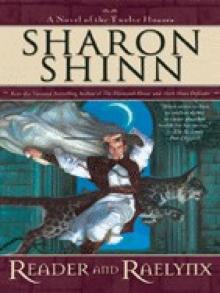 Reader and Raelynx
Reader and Raelynx Angel-Seeker
Angel-Seeker Archangel
Archangel Jeweled Fire
Jeweled Fire Nocturne
Nocturne The Shape-Changer's Wife
The Shape-Changer's Wife Still Life With Shape-Shifter
Still Life With Shape-Shifter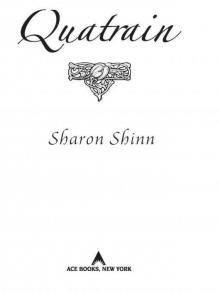 Quatrain
Quatrain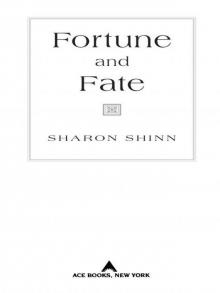 Fortune and Fate
Fortune and Fate Angelica
Angelica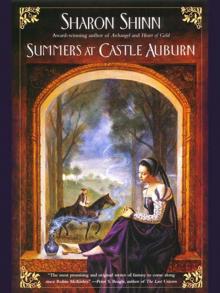 Summers at Castle Auburn
Summers at Castle Auburn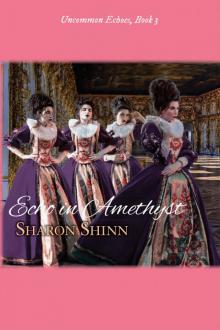 Echo in Amethyst
Echo in Amethyst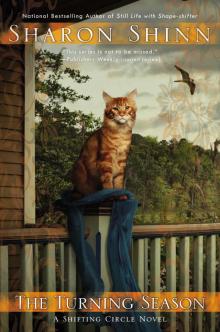 The Turning Season
The Turning Season Mystic and Rider
Mystic and Rider Heart of Gold
Heart of Gold The Shape of Desire
The Shape of Desire Echo in Onyx
Echo in Onyx Royal Airs
Royal Airs Gateway
Gateway The Safe-Keeper's Secret
The Safe-Keeper's Secret Wrapt in Crystal
Wrapt in Crystal Unquiet Land
Unquiet Land Jovah's Angel
Jovah's Angel Dark Moon Defender (Twelve Houses)
Dark Moon Defender (Twelve Houses) Mystic and Rider (Twelve Houses)
Mystic and Rider (Twelve Houses)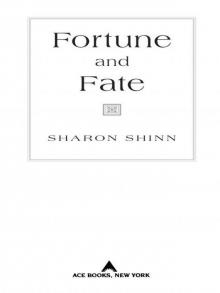 Fortune and Fate (Twelve Houses)
Fortune and Fate (Twelve Houses)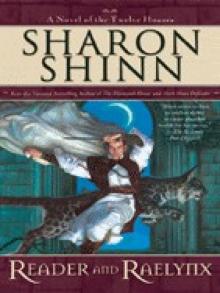 Reader and Raelynx (Twelve Houses)
Reader and Raelynx (Twelve Houses)